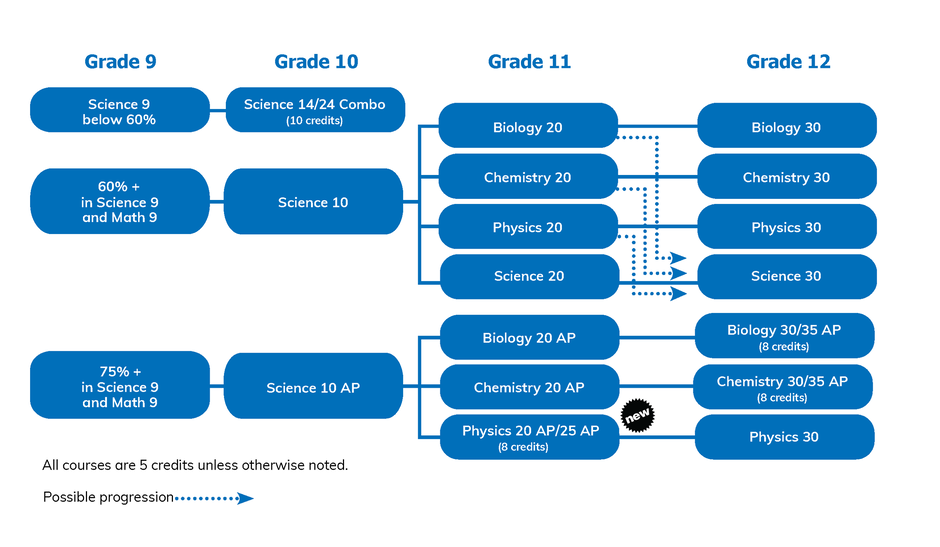Science inspires a sense of wonder and curiosity about the world. Studying the relationships between science, technology and society can help you understand how and why things work. You might even make discoveries that improve yourself and the world.
In order to receive an Alberta High School Diploma, students must complete a MINIMUM of one Grade 11 Science course (20 or 24 level). A mark of 60% or more in the pre-requisite course is recommended for registration. A mark of 75% is the pre-requisite recommended for Advanced Placement (AP) courses. Many post-secondary programs require Grade 12 Science courses.

There are four course routes for Science students at Paul Kane:
- Science 14 and 24 explore the basics of all three science streams and emphasize real-world connections. The program addresses the individual needs and preferences of the students and upon completion, it meets the science requirements for a high school diploma. Students may opt for Science 14/24 over Science 10 for additional support and resources in science studies. This choice is particularly suitable if students have diverse academic interests and don't plan to pursue science beyond high school, or if they aim for admission to post-secondary programs where a high school diploma is required, without the need for a 30-level science course.
-
The Science 10-20-30 stream is for those students who would like a Grade 12 academic Science course, but who will not be pursuing a career in a Science-related field.
- The Biology, Chemistry, and Physics courses are for students heading towards college or university or a specific science related field.
-
The Advanced Placement (AP) stream is designed for students who love Biology, Chemistry or Physics. Advanced Placement students write the same final exams as the regular courses but with the addition of the AP Biology exam, AP Chemistry exam, or AP Physics 1 exam as applicable (in May of Grade 11). Grade 10 students who excel in the Science 10 course may consult with their teacher and the Science Department Head for consideration for transfer into a 20 level AP science course.
Note: ALWAYS check information with the post-secondary institution and the program of your choice. Pre-requisites vary by institution and institutions sometimes review and change entrance requirements.
Courses
10 credits
Science 14 and 24 cover a range of scientific concepts across the three science disciplines (Biology, Chemistry and Physics). They aim to provide students with a foundational understanding of scientific principles, inquiry skills, and practical applications. They also enable students, of varying aptitudes and interests, to develop a knowledge of the wide spectrum of careers related to science, technology and the environment.
5 credits
In Science 10 students are introduced to Biology, Chemistry, Physics and Ecology.
In Science 10AP topics are explored to a greater depth.
Science 20 is a continuation of these four disciplines.
Science 30 covers advanced concepts.
Prerequisites for Science 30 are any one of Science 20 or Biology 20 or Chemistry 20 or Physics 20.
5 credits
Biology 20 focuses on human physiology and energy transfer in our biosphere.
Biology 20 AP has extra labs and deeper discussion of some concepts.
Biology 30 is about molecular biology, genetics, human physiology and reproduction.
Biology 30/35 AP students gain advanced experiences in scientific thinking and writing through lab activities.
5 credits
Chemistry 20 introduces students to chemical bonding and how and why substances react.
In Chemistry 20 AP more emphasis is on periodic table relationships, and chemical bonding.
Chemistry 30 introduces four new concepts: thermodynamics, electrochemistry, equilibrium reactions and organic chemistry.
Chemistry 30/35 AP students investigate higher level Chemistry and perform advanced laboratory experiments.
Note: The Chemistry stream of courses are math heavy and are not recommended for students in the math-3 stream.
5 credits
Physics 20 is about the mechanics of forces, motion, energy and waves.
Physics 20 AP/25 AP students investigate higher level Physics and perform advanced laboratory experiments.
Physics 30 focuses on momentum, forces, electromagnetic radiation and atomic physics.
Note: The Physics stream of courses are math heavy and are not recommended for students in the math-3 stream.
